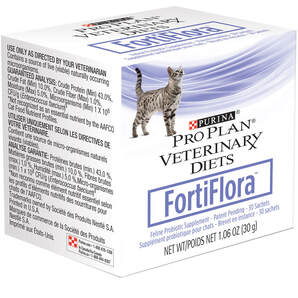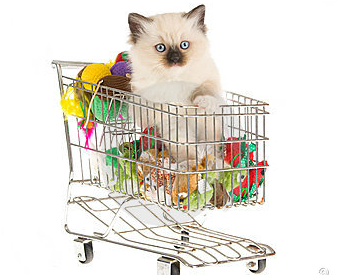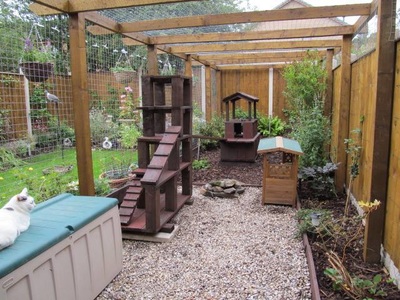preparing for your new kitten
Recommended Reading
Total Cat Mojo: The Ultimate Guide to Life with Your Cat Paperback – by Jackson Galaxy
Think Like a Cat: How to Raise a Well-Adjusted Cat--Not a Sour Puss – by Pam Johnson-Bennett
Please check out my "How To Video" page for helpful kitten TIPS.
Think Like a Cat: How to Raise a Well-Adjusted Cat--Not a Sour Puss – by Pam Johnson-Bennett
Please check out my "How To Video" page for helpful kitten TIPS.
Kitten Shopping List
There will be a "GO HOME EMAIL" 2 weeks before go home with all needed items listed. **ALWAYS buy the cat food LAST in case there is a food change before go home day.
WATER FOUNTAINS
Water fountains are great because the water is constantly moving and keeping the water from getting stagnant. Another great thing about water fountains is that they keep the cat fascinated with moving water and it gets them to drink more of it. There are 2 kinds that we recommend. The Ceramic Fountain is for those cats that love to tip things over. The Stainless Steel Fountain is lighter weight and easier to move if filled with water. My big boy Vlad loves to play in the water and tip it over so I have to keep a ceramic fountain in his room. IF you buy the ceramic fountain and have hard water at your house I suggest buying the white one so it doesn't show the hard water deposits all over the fountain.
FORTI-FLORA PROBIOTICS

- FortiFlora® is a probiotic supplement for cats *This has added chicken flavoring.
- Treats intestinal bacterial imbalances that often lead to diarrhea
- Promotes intestinal health, balance and a healthy immune system
- Feline formula includes Taurine
- Each box contains 30 1-dose packets
- **We use this during times of illness, a picky eater, transitioning food, or soft stools. Sprinkle this on the wet food and they will gobble it up.
tips about food and water & placement of bowls
Always make sure your cat has access to clean drinking water at all times. Siberians love moving water. A water fountain keeps the water fresh and circulating, which encourages your cat to drink more water.
Never place food or water bowls close to a noisy dishwasher or washing machine. The noise can be startling causing them to avoid their food and water bowls.
Never place food or water bowls close to a noisy dishwasher or washing machine. The noise can be startling causing them to avoid their food and water bowls.
KITTEN PROOF, KITTEN PROOF, KITTEN PROOF (before it comes home)
when you 1st bring The Kitten Home

A Purebred cat is like a house plant for the first 4 months until their Immune System hardiness kicks in. Any drastic change can effect them negatively. For instance stress can bring on Coccidia. This is why I tell you to get a fecal check at the 1st vet visit by taking in a fresh stool sample. Don't wait until the kitten gets Diarrhea and stops eating. At Vets bring a towel to put on the table, don't let them on the floor. This is a place where sick cats come.
1st thing Walk in the front door and take the kitten straight to the bathroom or laundry room.
Going to a new environment is stressful. Keep their world small; keep them in 1 room(bathroom or laundry room) with their litter box, food and water until they are using the box consistently. Just one person visiting them at a time. Leave the carrier in the room, it is their safe place. This is what I call Socialization/Isolation time. This gets the kitten focused in on you; their new caretaker. Gets them to realize that all good things come from their new human. You are now the person feeding them and loving them.
When they are used to the bathroom and coming up to you and purring and loving up on you they can then go to a larger room such as the bedroom. When overwhelmed they will hide. **Usually, they will not eat or drink until they feel comfortable in their new surroundings. Do not be concerned if they do not eat, drink, or use the litter right away. When changing to a new environment they will kind of shut down their food and water needs until they feel comfortable. Once they get used to their new home they will start to do all these things. Kitten may be a bit stressed when he first arrives to his new surroundings and away from his siblings. Some people like to use “Natures Miracle Cat Calming Spray” to help with any stress that they may have. Another good idea is to heat a bag of rice or dried beans in the microwave for a couple of minutes and wrap it in a towel. The kitten will lay on this as if he were cuddling up to his litter mates.
**Children need to give them space. Kittens don't always want to be picked up. Screaming thru the house while the kitten is still getting used to its new environment will stress them. This could cause the kitten to get sick. Have children adopt an inside voice or “Library voice”. Keep the kitten in mom and dads room until the kitten gets used to the sounds that are normal for your household. Kittens are active and want to play. If they are scared the best thing you can do is get them to play. Let them rest when tired. This will lessen their anxiety. Playing is very effective for this. If they anxious over getting their nails cut, then play with them afterwards.
LIST OF DO's
LIST OF DON'Ts
**Do Not Play Endlessly With Your Kitten. Your kitten will keep going until it drops, literally. Do not play for longer than 15 minutes or so at a time, and than allow your kitten to rest, sleep, eat and drink until they are showing they are ready to be played with again. For every 10 minutes of play, a kitten usually sleeps 1-2 hours. Tell your children to not disturb the kitten during rest/nap time.**
*Do not let a kitten play with your hand or bite it. Use a toy instead. You can view videos on how to teach your kitten to play gently HERE
*Don't let them chew on anything inappropriate such as wires, cardboard or hairballs. If left by themselves for a period of time, leave them in a room that won't pose any problems. Think of them like a 2 year old. You need to baby proof.
*** keep all dangerous items put away.***
*Remove Poisonous plants from the home. Go to this link: http://www.aspca.org/pet-care/animal-poison-control/toxic-and-non-toxic-plants
Scotchguard is poisonous.
Anti-freeze getting tracked into the house is especially poisonous.
Raisins, grapes, some plug-in aromas,
Swallowed Pennies are poisonous.
*Close washing machines, dryers, and toilet lids.
*Don't let them scratch furniture. Pick them up and put them on the Scratcher/Cat tree. Cover couches with Sheets until they learn better or use Soft Paws Claw covers. Never use water as a deterrent. Unless you plan on never bathing your cat.
1st thing Walk in the front door and take the kitten straight to the bathroom or laundry room.
Going to a new environment is stressful. Keep their world small; keep them in 1 room(bathroom or laundry room) with their litter box, food and water until they are using the box consistently. Just one person visiting them at a time. Leave the carrier in the room, it is their safe place. This is what I call Socialization/Isolation time. This gets the kitten focused in on you; their new caretaker. Gets them to realize that all good things come from their new human. You are now the person feeding them and loving them.
When they are used to the bathroom and coming up to you and purring and loving up on you they can then go to a larger room such as the bedroom. When overwhelmed they will hide. **Usually, they will not eat or drink until they feel comfortable in their new surroundings. Do not be concerned if they do not eat, drink, or use the litter right away. When changing to a new environment they will kind of shut down their food and water needs until they feel comfortable. Once they get used to their new home they will start to do all these things. Kitten may be a bit stressed when he first arrives to his new surroundings and away from his siblings. Some people like to use “Natures Miracle Cat Calming Spray” to help with any stress that they may have. Another good idea is to heat a bag of rice or dried beans in the microwave for a couple of minutes and wrap it in a towel. The kitten will lay on this as if he were cuddling up to his litter mates.
**Children need to give them space. Kittens don't always want to be picked up. Screaming thru the house while the kitten is still getting used to its new environment will stress them. This could cause the kitten to get sick. Have children adopt an inside voice or “Library voice”. Keep the kitten in mom and dads room until the kitten gets used to the sounds that are normal for your household. Kittens are active and want to play. If they are scared the best thing you can do is get them to play. Let them rest when tired. This will lessen their anxiety. Playing is very effective for this. If they anxious over getting their nails cut, then play with them afterwards.
LIST OF DO's
- Keep plants out of your kitten's reach by hanging them or placing them on shelves. Choose nontoxic plants like the jade plant, the prayer plant, the begonia, donkey tail, coleus or piggyback.
- Secure All Cords Electric cords can be particularly tempting, and bitten cords can result in severe burns or even death. Get rid of as many electrical cords as possible, and check remaining wires regularly for signs of chewing. Cords can be covered easily and cheaply with automotive vacuum hose, neoprene fuel lines, and for large groups of wires you can use clothes-drier exhaust hosing.
- Keep garbage away from your kitten. Securely fasten lids on trash containers, or store them under the sink or in the garage where the kitten can't reach them. Beware leaving sharp knives, food processor blades or other utensils out on counters where Kitty might try to lick them clean-and cut her tongue.
- Toys and String- Keep checking toys for loose pieces. String, Thread, Hair ties, and-Rubber Bands, especially any missing feathers. All of these cat get caught in their intestinal tract. Cats can not spit them out once they are on their tongue. Put away sewing baskets and Tackle boxes. Tie up Curtain cords. These are all strangulation and choking hazards.
LIST OF DON'Ts
**Do Not Play Endlessly With Your Kitten. Your kitten will keep going until it drops, literally. Do not play for longer than 15 minutes or so at a time, and than allow your kitten to rest, sleep, eat and drink until they are showing they are ready to be played with again. For every 10 minutes of play, a kitten usually sleeps 1-2 hours. Tell your children to not disturb the kitten during rest/nap time.**
*Do not let a kitten play with your hand or bite it. Use a toy instead. You can view videos on how to teach your kitten to play gently HERE
*Don't let them chew on anything inappropriate such as wires, cardboard or hairballs. If left by themselves for a period of time, leave them in a room that won't pose any problems. Think of them like a 2 year old. You need to baby proof.
*** keep all dangerous items put away.***
*Remove Poisonous plants from the home. Go to this link: http://www.aspca.org/pet-care/animal-poison-control/toxic-and-non-toxic-plants
Scotchguard is poisonous.
Anti-freeze getting tracked into the house is especially poisonous.
Raisins, grapes, some plug-in aromas,
Swallowed Pennies are poisonous.
*Close washing machines, dryers, and toilet lids.
*Don't let them scratch furniture. Pick them up and put them on the Scratcher/Cat tree. Cover couches with Sheets until they learn better or use Soft Paws Claw covers. Never use water as a deterrent. Unless you plan on never bathing your cat.



